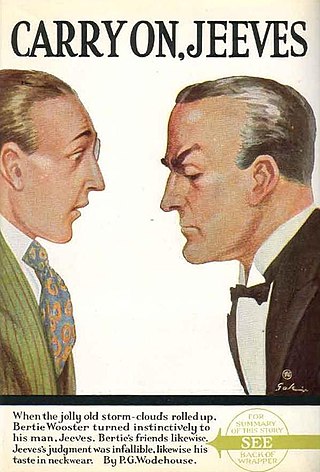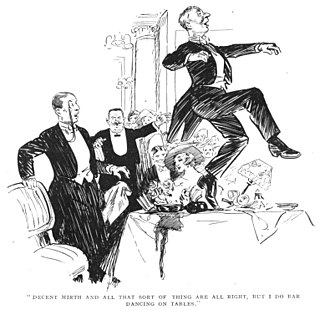
Jeeves is a fictional character in a series of comedic short stories and novels by English author P. G. Wodehouse. Jeeves is the highly competent valet of a wealthy and idle young Londoner named Bertie Wooster. First appearing in print in 1915, Jeeves continued to feature in Wodehouse's work until his last completed novel Aunts Aren't Gentlemen in 1974, a span of 60 years.

Agatha Gregson, née Wooster, later Lady Worplesdon, is a recurring fictional character in the Jeeves stories of the British comic writer P. G. Wodehouse, being best known as Bertie Wooster's Aunt Agatha. Haughty and overbearing, Aunt Agatha wants Bertie to marry a wife she finds suitable, though she never manages to get Bertie married, thanks to Jeeves's interference.

The Inimitable Jeeves by P. G. Wodehouse was the first of the Jeeves novels, although not originally conceived as a single narrative, being assembled from a number of short stories featuring the same characters. The book was first published in the United Kingdom by Herbert Jenkins, London, on 17 May 1923 and in the United States by George H. Doran, New York, on 28 September 1923, under the title Jeeves.

Carry On, Jeeves is a collection of ten short stories by P. G. Wodehouse. It was first published in the United Kingdom on 9 October 1925 by Herbert Jenkins, London, and in the United States on 7 October 1927 by George H. Doran, New York. Many of the stories had previously appeared in the Saturday Evening Post, and some were rewritten versions of stories in the collection My Man Jeeves (1919). The book is considered part of the Jeeves canon.

"Extricating Young Gussie" is a short story by the British comic writer P. G. Wodehouse. It was first published in the United States in the 18 September 1915 issue of The Saturday Evening Post and in the United Kingdom in the January 1916 edition of The Strand Magazine. It was included in the collection The Man with Two Left Feet (1917).

Very Good, Jeeves is a collection of eleven short stories by P. G. Wodehouse, all featuring Jeeves and Bertie Wooster. It was first published in the United States on 20 June 1930 by Doubleday, Doran, New York, and in the United Kingdom on 4 July 1930 by Herbert Jenkins, London. The stories had all previously appeared in Strand Magazine in the UK and in Liberty or Cosmopolitan magazines in the US between 1926 and 1930.

The Mating Season is a novel by P. G. Wodehouse, first published in the United Kingdom on 9 September 1949 by Herbert Jenkins, London, and in the United States on November 29, 1949, by Didier & Co., New York.

"Aunt Agatha Takes the Count" is a short story by P. G. Wodehouse, and features the young gentleman Bertie Wooster and his valet Jeeves. The story was published in The Strand Magazine in London in April 1922, and then in Cosmopolitan in New York in October 1922. The story was also included in the 1923 collection The Inimitable Jeeves as two separate chapters, "Aunt Agatha Speaks Her Mind" and "Pearls Mean Tears".

"Scoring off Jeeves" is a short story by P. G. Wodehouse, that features a young gentleman Bertie Wooster and his valet Jeeves. The story was published in The Strand Magazine in London in February 1922, and then in Cosmopolitan in New York in March 1922. The story was also included in the 1923 collection The Inimitable Jeeves as two separate chapters, "The Pride of the Woosters Is Wounded" and "The Hero's Reward".

"Sir Roderick Comes to Lunch" is a short story by P. G. Wodehouse, and features the young gentleman Bertie Wooster and his valet Jeeves. The story was published in The Strand Magazine in London in March 1922, and then in Cosmopolitan in New York in April 1922. The story was also included in the 1923 collection The Inimitable Jeeves as two separate chapters, "Introducing Claude and Eustace" and "Sir Roderick Comes to Lunch".

"The Delayed Exit of Claude and Eustace" is a short story by P. G. Wodehouse, and features the young gentleman Bertie Wooster and his valet Jeeves. The story was published in The Strand Magazine in London in October 1922, and then in Cosmopolitan in New York in November 1922. The story was also included in the 1923 collection The Inimitable Jeeves.
"Jeeves and the Greasy Bird" is a short story by English humorist P. G. Wodehouse, and features the young gentleman Bertie Wooster and his valet Jeeves. The story was published in Playboy magazine in the United States in December 1965, and in Argosy magazine in the United Kingdom in January 1967. The story was also included in the 1966 collection Plum Pie.

"Jeeves and the Unbidden Guest" is a short story by P. G. Wodehouse, and features the young gentleman Bertie Wooster and his valet Jeeves. The story was published in the Saturday Evening Post in the United States in December 1916, and in The Strand Magazine in the United Kingdom in March 1917. The story was also included in the 1925 collection Carry On, Jeeves.
"Clustering Round Young Bingo" is a short story by P. G. Wodehouse, and features the young gentleman Bertie Wooster and his valet Jeeves. The story was published in the Saturday Evening Post in the United States in February 1925, and in The Strand Magazine in the United Kingdom in April 1925. The story was also included in the 1925 collection Carry On, Jeeves.
"Episode of the Dog McIntosh" is a short story by P. G. Wodehouse, and features the young gentleman Bertie Wooster and his valet Jeeves. The story was published in The Strand Magazine as "Jeeves and the Dog McIntosh" in the United Kingdom in October 1929, and in Cosmopolitan as "The Borrowed Dog" in the United States that same month. The story was also included as the fifth story in the 1930 collection Very Good, Jeeves.
"The Spot of Art" is a short story by P. G. Wodehouse, and features the young gentleman Bertie Wooster and his valet Jeeves. The story was published in The Strand Magazine in the United Kingdom in December 1929, and in Cosmopolitan in the United States that same month, as "Jeeves and the Spot of Art". The story was also included as the sixth story in the 1930 collection Very Good, Jeeves.
"The Love that Purifies" is a short story by P. G. Wodehouse, and features the young gentleman Bertie Wooster and his valet Jeeves. The story was published in The Strand Magazine in the United Kingdom in November 1929, and in Cosmopolitan in the United States that same month, as "Jeeves and the Love that Purifies". The story was also included as the eighth story in the 1930 collection Very Good, Jeeves.
"Jeeves and the Old School Chum" is a short story by P. G. Wodehouse, and features the young gentleman Bertie Wooster and his valet Jeeves. The story was published in The Strand Magazine in the United Kingdom in February 1930, and in Cosmopolitan in the United States that same month. The story was also included as the ninth story in the 1930 collection Very Good, Jeeves.
"Indian Summer of an Uncle" is a short story by P. G. Wodehouse, and features the young gentleman Bertie Wooster and his valet Jeeves. The story was published in The Strand Magazine in the United Kingdom in March 1930, and in Cosmopolitan in the United States that same month. The story was also included as the tenth story in the 1930 collection Very Good, Jeeves.
"The Ordeal of Young Tuppy" is a short story by P. G. Wodehouse, and features the young gentleman Bertie Wooster and his valet Jeeves. The story was published in The Strand Magazine in the United Kingdom in April 1930, and in Cosmopolitan in the United States that same month, both as "Tuppy Changes His Mind". The story was also included as the eleventh story in the 1930 collection Very Good, Jeeves.











